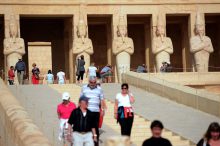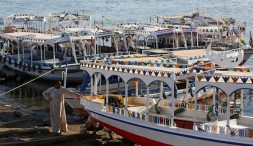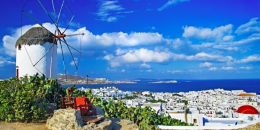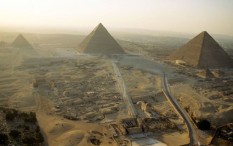Category: TOURISM
-

Egypt to launch cruise lines with Greece in latest efforts to revive tourism
As part of the state’s continuous efforts to attract additional tourists and revive the country’s ailing tourism industry, Egypt’s Ministry of Tourism reached an agreement with Greece last week to launch cruise lines between the two countries, international relations advisor to the Tourism Minister Samy Mahmoud said. The trips will begin with medium-sized cruise ships…
-

Greece expects tourism record for 2017
A record number of tourist visitors in 2016 was not enough, but it did certainly do the country good. As the 2017 tourist season starts, the industry is banking on an even better year.The tourist season in the old harbour of Skopelos island off Greece’s eastern coast is starting, as it often does, in a…
-

Dahab’s Underwater Museum: a Kiss of Life to the Red Sea Ecosystem
When the IDive Tribe started an underwater museum in Sinai’s Dahab four years ago, people thought they were insane. Now, the team of divers is planning their second museum in Hurghada. February witnessed the latest addition to the museum: a statue to honor the Egyptian diver and holder of the world record of the deepest…
-

Egypt Plans to Implement ‘Electronic Visa Application System’ to Attract More Tourists
In a step that aims to facilitate visa procedures to tourists, Egypt’s Interior Minister Magdy Abdel-Ghaffar met with Telecommunication Minister Yasser Al-Qady to discuss the development of a new system that will allow issuance of electronic visas. The step is expected to positively affect the tourism sector and the rate of incoming tourists to Egypt,…
-

Egypt to increase visa fees for incoming tourists by 140%
Tourists will have to pay $60 for their entry visa to Egypt, compared to the previous $25 for single entry and $70 for multiple entry visas, Egyptian airport officials said. They also added that banks and travel and tour agencies have received notifications from the Ministry of Foreign Affairs regarding the new price, which will…
-

Egypt sets up new fund to revive tourism industry
Egypt has set up a new fund worth 5 billion Egyptian pounds ($267 million) to upgrade hotels, tourist resorts and Nile floating boats across the country as part of efforts to revive its ailing tourism industry. The new fund, which was announced by the Central Bank of Egypt (CBE) on Dec. 26, would finance maintenance and…
-

South Aegean named European Region of Gastronomy 2019
The title of European Region of Gastronomy 2019 has been awarded to the South Aegean in Greece and the Transylvanian town of Sibiu in Romania, the international jury announced on the 29th of September. The title is awarded each year by the IGCAT (International Institute of Gastronomy, Culture, Arts and Tourism) with the support of…
-

Hurghada witnesses the opening of Egypt’s first miniature city
Imagine having all of Egypt’s wonders and mesmerising monuments in one place, where one can go from the pyramids of Giza to Karnak temple in Luxor before paying a short visit to a Roman amphitheatre and the luxurious Montazah Palace in Alexandria. This has become possible just by visiting the Mini Egypt Park. Mini Egypt…
-

World Travel Market: Tourism in Egypt, Greece, Turkey ‘Getting Back on Track’
Tourism “could be getting back on track” in Egypt, Turkey and Greece, according to an industry report released by the World Travel Market on Monday. “After a difficult couple of years, the signs are that Egypt, Greece and Turkey are back on the agenda, while Tunisia is starting to turn the corner,” said Simon Press,…
-

Egypt Tourism ‘Will Recover,’ Return to Pre-2011 Levels Next Year: World Travel Council Official
Egyptian tourism will “return rapidly” to its pre-2011 levels by early 2017, World Travel and Tourism Council (WTTO) chairman David Scowsill said during the fifth Global Summit on City Tourism, held in Luxor. According to privately-owned El-Watan newspaper, Scowsill praised the newly imposed security measures at Egypt’s airports and said he would report what he has…